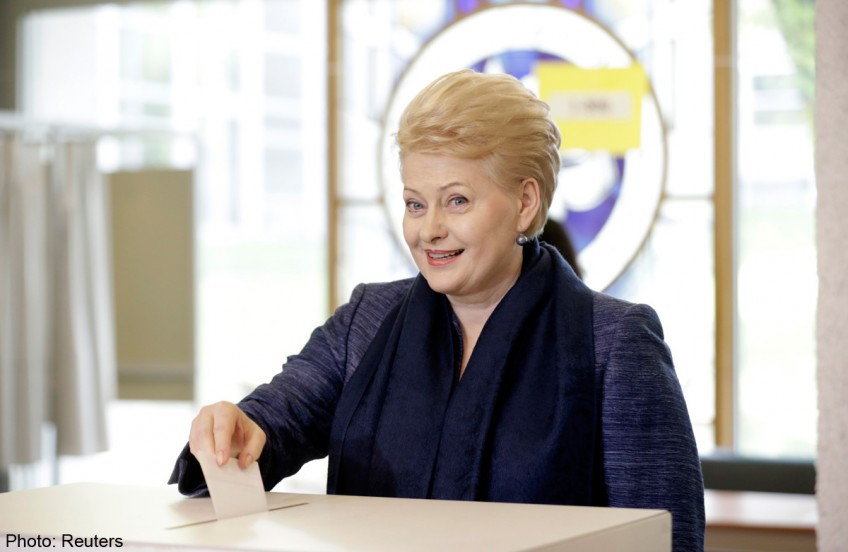Lithuania's 'Iron Lady' to face leftist in presidential run-off

VILNIUS - Lithuania's incumbent "Iron Lady" Dalia Grybauskaite took pole position in a presidential race Sunday marked by her hard line against a resurgent Russia amid the Ukraine crisis, but will face a leftist in round two.
The karate black belt scored 45.8 of the vote compared to 13.7 per cent for Social Democrat MEP Zigmantas Balcytis with 97.7 per cent of votes counted, official results showed, triggering a final face off on May 25.
Nicknamed the "Iron Lady" for her Thatcheresque resolve, Grybauskaite topped the poll as many see her as their best chance to fend off unwanted Russian advances amid Europe's worst standoff with Moscow since the Cold War.
"I thank everyone and I hope all of us will be loyal to our country," she told reporters as the result rolled in.
"I believe that everyone who voted for me today will come to support me in two weeks," she added.
Ahead of the ballot, the 58-year-old had vowed to "take a gun myself to defend the country if that's what's needed for national security".
By contrast, the 60-year-old Balcytis has taken a decidedly more cautious approach on Russia and focused on bread and butter social issues instead.
"I have a vision and ideas about what to do so that people have jobs and are earning," Balcytis, who previously served as transport and finance minister, told reporters as he feted his unexpected advance to round two.
Grybauskaite needed to win half of the votes cast with a turnout of at least 50 per cent for an outright first-round victory, a feat she easily pulled off in 2009.
Official turnout Sunday tallied at 52.10 per cent of the country's 2.5 million registered voters.
Analysts were cautious in their predictions for round two.
"The incumbent president will be the favourite, but she is not an absolute one. Balcytis can collect quite a few votes from other candidates," Ramunas Vilpisauskas, head of the Vilnius-based Institute for International Relations and Political Science, told AFP.
"Some voters like his soft approach, but that could turn to a disadvantage...appearing like a lack of determination," he added.
Five other candidates were eliminated Sunday.
The election comes as Russia's annexation of Ukraine's former Crimean peninsula and sabre-rattling in the neighbouring Russian exclave of Kaliningrad have sparked deep-seated fears in Lithuania, a country of three million.
Elvyra Vaicaityte, a student in a border town, is spooked by rumblings of military might in Kaliningrad, sandwiched between Lithuania and fellow NATO member Poland.
"I can hear explosions during exercises, and windows often rattle - I don't feel very secure," the 23-year-old told AFP.
Iron will versus soft touch
Grybauskaite first urged and then welcomed the arrival of American troops last month as NATO stepped up its presence in the Baltic states, which spent five decades under Soviet occupation until 1991.
Having joined the EU and NATO in 2004, Lithuania along with fellow Baltic states Latvia and Estonia are all keen to see more Alliance boots on the ground amid the Ukraine crisis.
"Russia has always been a threat. I was deported to Siberia at the age of eight and spent 14 years there," Pranas Baltrenas told AFP after he and his wife voted for Grybauskaite.
"We saw a period of thaw after regaining independence, but now we're seeing provocations again. We must react to the current situation, and I think Grybauskaite's reaction is appropriate," he said.
She has backed the country's first liquefied natural gas (LNG) terminal intended to boost energy security by decreasing dependence for gas on Russia's Gazprom.
The former EU budget commissioner also sees eurozone entry in 2015 as an economic buffer against Moscow.
In contrast to her firm line, rival Balcytis insist on dialogue with Moscow.
"We'll have to seek dialogue with Russia. Any kind of peace is better than a war," he told voters on the campaign trail.
He now is poised to take that approach into round two.
Vilnius pensioner Vytautas Valanciunas said it is why he voted for the social democrat.
"We need to increase people's welfare and improve pensions," he told AFP.
Joblessness here stands at 9.8 per cent with the economy set to grow by 3.4 per cent this year for of the fastest rates of expansion in the EU.